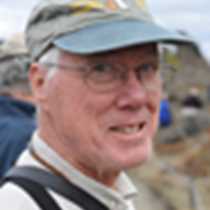The Northwest Corner of South Georgia Island
For our final day on South Georgia we have reached the northwest corner of this incredible island. We entered Right Whale Bay to watch the waves surging on the beach. But a landing? ... no way. We moved westward to the narrow bay of Elsehul, finding protection from the swell, and the sun came out to greet us. Once more into our Zodiacs!
The fluffy gray specks in the tussock grass were the chicks of black-browed and gray-headed albatrosses. The large bare area on a steep slope in the tussock was a breeding colony of macaroni penguins. Macaronis are raucous penguins; their braying calls formed an acoustic background for the sharper barks of Antarctic fur seals. Our Zodiacs rose and fell with the swells as we watched the penguins coming down the slope to enter the water with a not-so-graceful flop, and off they went to forage for the single chick waiting in the colony above. When we first arrived it was fur seal naptime on the beach, but as the day progressed they came out in hordes to frolic in the kelp and the pools where ocean swells broke over the rocks. Elephant seals just lay on the beaches in molting heaps, oblivious to the frenetic behavior of the fur seals and the stately strutting of regal king penguins.
Macaronis are the most numerous penguins in the world. Most breed on sub-Antarctic islands. They are the most abundant penguins on South Georgia, but I have often wondered where they all are. No longer. Off the western tip of South Georgia several islands rise straight up from the sea, with impressive waves crashing at their base. To say that the National Geographic Explorer made a close approach scarcely describes the moment. Our ship tucked into a narrow cove in Trinity Island, putting nesting albatrosses and huge macaroni penguin colonies at our eye level.
Macaronis seem to be fastidious penguins. After entering the water they engage in active bouts of bathing, rolling and splashing to remove the grime of their most recent trip ashore. Dirty penguins come down the hill; clean penguins go up. Over and over it is repeated until their annual breeding is completed. And we were there to watch!
When James Cook completed his voyage to the Southern Ocean with HMS Resolution and Adventure he had gone farther south than any man, and he had disproved the notion of the supposed massive southern continent, terra australis incognita. Among his many discoveries was this island that he claimed for England in the name of his sovereign, King George. A consummately practical man, he could see no economic benefit and thus no reason for anyone else to visit these cold, bleak and dismal shores. Great navigator; great explorer; bad prognosticator. 140 Guests aboard National Geographic Explorer have been enthralled by the stark beauty and wildlife bounty of this Antarctic oasis.



